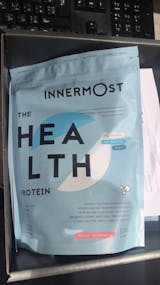As you may be aware by now, here at Innermost we advocate for a healthy lifestyle and that includes keeping one’s body in check. Exercising can be a gruelling task for many – especially with these troublesome bleak winter months. We too emphasise with this mindset which means we are always searching far and wide for up-and-coming advice and tips to make your fitness journey a smoother ride. We all want to reap the most benefit possible during our daily and weekly fitness sessions, don't we? If there’s an alternative way to stay in shape, then we will be jumping on that bandwagon straight away (no shame here).
Well, today’s your lucky day…introducing the Edith Cowan University Study.
If you are someone that likes to go hard at the gym and spends hours on end pushing yourself in a 1, 2, maybe even 3 hours session fuelled by your favourite protein shake…um hello The Fit Protein – we see you. Then have you ever considered whether this way is the most beneficial approach? Sit back and relax (for once) as this study may just revolutionise your fitness journey forever.
The study low down
Without further ado, let’s dive straight into it. This latest exercise study dated the 15th of August of this year was implemented by Edith Cowan University (ECU) in collaboration with two Japanese universities: Niigata University and Nishi Kyushu University. The research took place over four weeks and involved three groups of participants – the experiment query was simple, is it better to exercise little but often, or put your all into a few sessions a week? The results were fascinating.
Across the four allocated weeks, the individuals performed arm resistance exercises with their muscle strength and thickness carefully monitored. Set up like your average weight session, the bicep contractions were taken out on a machine that measured muscle strength per contraction. The study was straightforward yet effective – two of the groups did 30 contractions per week, with the first across the five days only performing six contractions. The second group did all 30 contractions once a week, and the third final group only participated with six contractions once a week.
So, what were the results?
Once the allocated four weeks were up, it was time to conclude the study. Interestingly, the group of individuals that were doing all 30 of their bicep contractions in one day did not show enhanced muscle strength…but muscle thickness did increase by a small 5.8 percent. With no surprise, the group that did not show any change in both muscle strength and thickness was the cohort that was only exercising their arms once a week for 6 reps. However, last but no means least, we have the second group - the souls that had to do six muscle curls a day for five days. Astonishingly, once calculated, there was over 10% muscle strength enhancement with the same increase in thickness as the 30 reps a day group. Fascinating!
The findings
As the study revealed, firstly it is all about the frequency when it comes to exercising and not the volume. Small amounts of fitness each day can have a greater impact on someone’s strength – who would have thought huh? The avid gym enthusiast usually homes in on the prospect of a lengthy resistance training session, but now there’s proven evidence that little and often is more beneficial. Although this was only done to a select area of the body, it is stated that this will have the same effect on other muscles as well. The experiment goes on to say that exercising this way will in the long run help combat aging, as well as deter certain muscle-related illnesses like cancers, dementia, cardiovascular diseases, and type 2 diabetes.
Another key finding is that the body benefits from more rest than we thought. This study reiterated the importance of rest days and showed that our body muscles need a regular break during the week to improve their strength. So, for those of you who fret about taking time away from the gym, there’s no need to think this way. The next time you avoid the gym for a day or two, consider the benefits instead of the negatives. There are also other positives in smaller but frequent gym sessions too, and these include:
- The risk of workout injuries can be minimised
- Decreases the chances of burnout during a workout
- Improves your focus – short but sweet
- Better for those who have a love/hate relationship with exercise
- Is it said to help lower blood sugars, especially exercising after a meal
Summary
Surprised? We are too! Who would have thought that your daily quick 30-minute session at the gym or an after-lunch walk with your work bestie, would actually be doing you a world of good? Of course, we are not telling you how to live your life, and if you prefer the high-intensity of a long endurance workout – then you do you. In contrast, for those newbies amongst you all, there’s now more of a means to embark on your own fitness endeavour – there’s no time like the present. Start small and slowly build your way up. After all, wasn’t it the tortoise that won the race? You’ve got this!
If you or anyone else you know has any inspirational ideas to share, just like this study, don’t hesitate to contact us over on our Instagram @liveinnermost
References
- Edith Cowan University. (2022). Exercise answer: Research shows it's how often you do it, not how much: We all know exercise is important, but is it better to do a little every day, or a lot a few times a week? ScienceDaily. Click Here
























